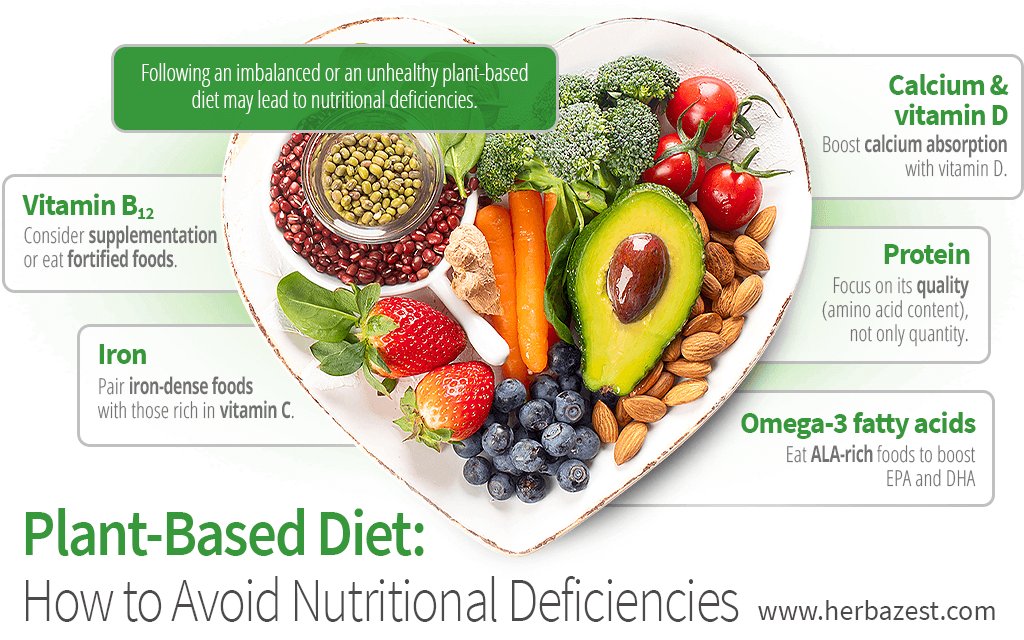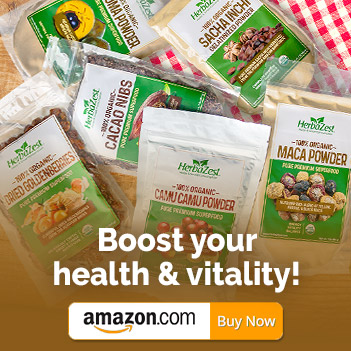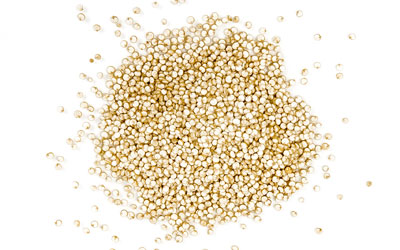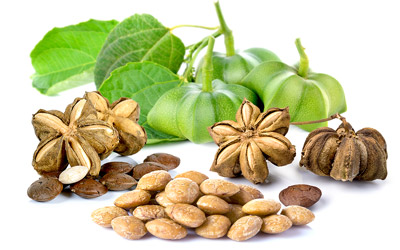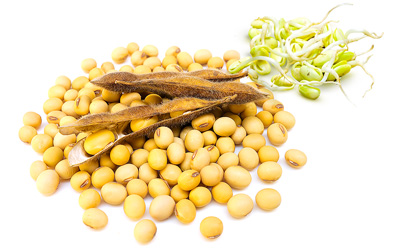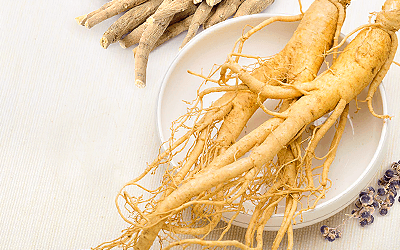One of the most common misconceptions about a plant-based diet is that it is - almost by default - a healthy diet. While studies do, indeed, link higher plant consumption with numerous health benefits, some vegan foods available on the market are highly processed and packed with artificial additives.
As a result, many vegans may follow an imbalanced or an unhealthy plant-based diet, leading to nutritional deficiencies. Fortunately, many of them can be easily prevented with a handful of wholesome foods. Find out how to thrive on a vegan diet, including most commonly deficient nutrients and how to obtain them from plants.
1. Vitamin B12
- Nutritional yeast
- Plant-based milk
- Cereal
- Vegan meat products
RDA for vitamin B12=2.4 μg2
Vitamin B12 deficiency is one of the most common nutritional deficiencies in a plant-based diet. In fact, one study has found that 52% of the participating vegans were vitamin B12 deficient.1
The tricky part is that the vitamin is found in plants only in negligible amounts. As such, vegans are recommended to take vitamin B12 supplements or eat foods that are fortified with the vitamin.
Keep in mind that some of those products may be highly processed. Reading labels and choosing wholesome options will help you reach your nutritional goals without compromising your health.
2. Protein
- Sacha inchi
- Lentils
- Chickpeas
- Quinoa
- Hemp seeds
- Tofu
RDA for protein= 0.8 g/per kg of body weight3
Contrary to what's commonly believed, most vegans do get enough protein in their diet. However, some may not be aware that the quality of protein they consume is as important as its quantity.
The quality of a protein relates to its content of essential amino acids as well as its digestibility. Essential amino acids are not produced in body and must be obtained from food.
While many plant-based foods contain protein, most lack one or more of the nine essential amino acids. Those that do provide all of them are referred to as complete protein sources.
There are only a few vegan complete proteins out there. So, vegans are advised to include a rich variety of protein-rich foods (both complete and incomplete) to ensure that they're covering their needs for essential amino acids.
3. Iron
- Lentils
- Cacao
- Chickpeas
- Kale
- Beans
- Chia seeds
- Ground flaxseed
- Pumpkin seeds
RDA for iron= 8 mg (men) and 18 mg (women 19-50)/8 mg (women over 51)5
Studies have produced conflicting results in terms of the likelihood of vegans to suffer from iron deficiency. Some suggest that while anemia is unlikely among vegans, lower ferritin levels are quite common.4
Ferritin is a protein that stores iron in the cells. Lower ferritin stores in vegans are generally associated with insufficient intakes of iron-containing foods, which can be fixed with simple diet modifications.
To prevent iron deficiency, vegans should opt not only for iron-rich fruits, vegetables, and whole grains, but also those containing vitamin C, which enhances the body's absorption of iron.
4. Calcium and Vitamin D
- Bok choy
- Broccoli
- Chickpeas
- Poppy seeds
- Mustard greens
- Watercress
- Edamame
RDA for calcium= 1,000-1,200 mg (depending on age and sex)6; RDA for vitamin D= 600 IU7
Several trials have shown that plant-based diet deficiencies may also relate to calcium and vitamin D. Calcium lacks are not only linked to lower intakes of the mineral, but also its lower bioavailability in plant-based foods.
The reason why vitamin D is oftentimes listed alongside calcium is because it aids the absorption of the mineral. Without it, the body may not absorb it sufficiently, increasing the risk of osteoporosis and fractures.
While there are numerous plant-based sources of calcium, vitamin D can be obtained from mushrooms, fortified foods (e.g., cereal, some orange juices, etc.), and sunlight exposure.
5. Omega-3 Fatty Acids
Vegans may also be lacking two omega-3 fatty acids: docosahexaenoic acid (DHA) and eicosapentaenoic acid (EPA). Omegas are a group of polyunsaturated fatty acids, colloquially referred to as healthy fats.
While there are plenty of EPA-rich vegan foods, DHA is not found in most plants. The only plant food that contains both EPA and DHA is algal oil.
The good news is that many plant-based foods contain a third type of omega-3 fatty acid, called alpha-linolenic acid (ALA). Small amounts of ALA are converted in the body into DHA and EPA.
Therefore, vegans are recommended to enrich their diets with a selection of ALA-containing foods. Some also opt for DHA supplements from algae to ensure proper levels.
Other Nutrients to Monitor on a Plant-Based Diet
Several studies have emphasized the risk of developing other nutritional deficiencies in vegans, including the following:
- Zinc found in lentils, chickpeas, tofu, pumpkin seeds, walnuts, cashews, and chia seeds
- Iodine found in cranberries, green beans, kale, watercress, strawberries, and potatoes
- Selenium found in soybeans, tofu, Brazil nuts, shiitakes mushrooms, pinto beans, brown rice, and oats
- Vitamin B2 found in avocado, almonds, wild rice, mushroom, seaweed, and nutritional yeast
Following a plant-based diet offers a multitude of health benefits as long as it is done with the right knowledge and preparation. Obtaining the necessary nutrients from plants certainly requires more planning than doing so from animal sources. It may also involve some supplementation to prevent dietary deficiencies and avoid putting your health in jeopardy. While there are abundant resources on veganism out there, consulting a nutritionist and undergoing regular bloodwork are simple ways to help you stay healthy on a vegan diet.
Sources
- Clinical Nutrition Journal, Intake and adequacy of the vegan diet. A systematic review of the evidence, 2021
- Journal of Osteopathic Medicine, How to Monitor and Advise Vegans to Ensure Adequate Nutrient Intake, 2016
- Journal of Sports Science & Medicine, Protein – Which is Best?, 2016
- Nutrients, Dietary Protein and Amino Acids in Vegetarian Diets – A Review, 2019 | Iron Deficiency in Vegetarian and Omnivorous Individuals: Analysis of 1340 Individuals, 2021
- Mayo Clinic, Vegans may lack essential nutrient intake, study reports, 2016
Footnotes:
- European Journal of Clinical Nutrition. (2010). Serum concentrations of vitamin B12 and folate in British male omnivores, vegetarians and vegans: results from a cross-sectional analysis of the EPIC-Oxford cohort study. Retrieved October 28, 2022, from https://www.nature.com/articles/ejcn2010142
- NIH. (2022). Vitamin B12. Retrieved October 28, 2022, from https://ods.od.nih.gov/factsheets/VitaminB12-HealthProfessional/
- Harvard Health Publishing. (2022). How much protein do you need every day? Retrieved October 28, 2022, from https://www.health.harvard.edu/blog/how-much-protein-do-you-need-every-day-201506188096
- American Journal of Lifestyle Medicine. (2018). Iron Status of Vegetarian Adults: A Review of Literature. Retrieved October 28, 2022, from https://www.ncbi.nlm.nih.gov/pmc/articles/PMC6367879/
- NIH. (2022). Iron. Retrieved October 28, 2022, from https://ods.od.nih.gov/factsheets/Iron-Consumer/
- NIH. (2022). Calcium. Retrieved October 28, 2022, from https://ods.od.nih.gov/factsheets/Calcium-Consumer/
- NIH. (2022). Vitamin D. Retrieved October 28, 2022, from https://ods.od.nih.gov/factsheets/VitaminD-Consumer/
- NIH. (2022). Omega-3 Fatty Acids. Retrieved October 28, 2022, from https://ods.od.nih.gov/factsheets/Omega3FattyAcids-Consumer/


